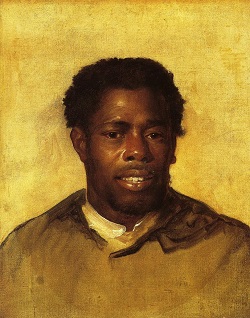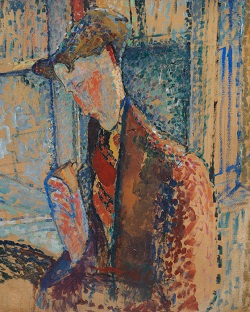How are you?
Currently, I am introducing the
stories about various artists and their paintings with the title “Interesting Art
Stories”.
The 72nd story is “Watson and the
Shark” by John Singleton Copley.
“Watson and the Shark” is an oil painting by the American painter John Singleton Copley, depicting the rescue of the English boy Brook Watson from a shark attack in Havana, Cuba.
 |
| Self-Portrait, John Singleton Copley, National Portrait Gallery, Washington, D.C. (c. 1780–1784) |
Copley painted three versions of this painting while living in London at the
time. The 1778 version is now in the National Gallery of Art, Washington, D.C.,
a second, same sized 1778 version is in the Museum of Fine Arts, Boston, and a
third, smaller 1782 version with a more vertical composition is in the Detroit
Institute of Arts.
 |
| Main facade of the National Gallery of Art, Washington DC |
This painting is based on a shark’s attack in
Havana harbor in 1749. Brook Watson, then a 14-year-old cabin boy on the Royal
Consort, lost his leg in the attack and was not rescued until the third attack,
which is the subject of this painting. Then, serving in the military and
becoming a successful merchant, Watson commissioned this painting from Copley
25 years after the incident.
 |
| Sir Brook Watson, John Singleton Copley, Indianapolis Museum of Art (c.1796) |
Copley and Watson became friends after Copley arrived in London in 1774. Watson commissioned him to paint the picture of the 1749 event, and Copley painted three versions. This painting was the first of a series of large-scale historical paintings that Copley focused on after settling in London.
 |
| Second version, Museum of Fine Arts, Boston (1778) |
 |
| Third version, Detroit Institute of Arts (1782) |
However, although there are some traces of blood in the water, this painting does not express the actual feeling caused by the injury, giving it a somewhat feeling of romantic paintings. The figure of Watson depicted in this painting is based on the "Borghese Gladiator", the statue by Agasias of Ephesus in the Louvre.
 |
| Borghese Gladiator, Agasias of Ephesus, Marble, Musée du Louvre (c.100 BC) |
Other influences are Renaissance
art and the “Laocoön and his Sons” which Copley may have seen in Rome, as well
as by Benjamin West's “The Death of General Wolfe” and romantic paintings.
 |
| Laocoön and His Sons, Marble, Vatican Museums, Vatican City |
 |
| The Death of General Wolfe, Benjamin West (1770) |
The composition of the rescuers in the boat appears to have been inspired by Peter Paul Rubens' “Jonah Thrown into the Sea”, and Rubens' “Miraculous Draught of Fishes” and Raphael's painting of the same name.
 |
| Miraculous Draught of Fishes, Peter Paul Rubens, oil on wood (1610) |
 |
| The Miraculous Draught of Fishes, Raphael (1515) |
It was also revealed that various elements of composition were
changed as the painting progressed. Infrared analysis revealed that the old
sailor was originally a young man, and from preliminary sketch analysis, it
showed that the black sailor at the rear of the boat, who also appears as the
subject of Copley's “Head of a Negro” drawn at the same time, was originally a
white man with long hair.
 |
| Head of a Negro, John Singleton Copley (1778) |
Since Copley had never visited Havana, the
details of Havana harbor seem to have been collected from prints and book
illustrations, and Copley's depiction of sharks, who had never seen a shark and
much less one attacking a person, is less realistic in its anatomical features.
Thank you.






















